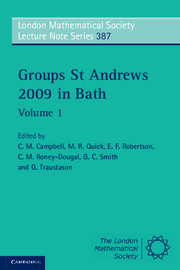Book contents
- Frontmatter
- Contents
- Introduction
- A speech in honour of John Cannon and Derek Holt
- Finite groups of Lie type and their representations
- Iterated monodromy groups
- Engel elements in groups
- Some classes of finite semigroups with kite-like egg-boxes of D-classes
- Structure of finite groups having few conjugacy class sizes
- Group theory in cryptography
- A survey of recent results in groups and orderings: word problems, embeddings and amalgamations
- A survey on the minimum genus and maximum order problems for bordered Klein surfaces
- On one-relator quotients of the modular group
- Miscellaneous results on supersolvable groups
- Automorphisms of products of finite groups
- A rational property of the irreducible characters of a finite group
- Automotives
- On n-abelian groups and their generalizations
- Computing with matrix groups over infinite fields
- Trends in infinite dimensional linear groups
- Engel conditions on orderable groups and in combinatorial problems (a survey)
- References
Miscellaneous results on supersolvable groups
Published online by Cambridge University Press: 05 July 2011
- Frontmatter
- Contents
- Introduction
- A speech in honour of John Cannon and Derek Holt
- Finite groups of Lie type and their representations
- Iterated monodromy groups
- Engel elements in groups
- Some classes of finite semigroups with kite-like egg-boxes of D-classes
- Structure of finite groups having few conjugacy class sizes
- Group theory in cryptography
- A survey of recent results in groups and orderings: word problems, embeddings and amalgamations
- A survey on the minimum genus and maximum order problems for bordered Klein surfaces
- On one-relator quotients of the modular group
- Miscellaneous results on supersolvable groups
- Automorphisms of products of finite groups
- A rational property of the irreducible characters of a finite group
- Automotives
- On n-abelian groups and their generalizations
- Computing with matrix groups over infinite fields
- Trends in infinite dimensional linear groups
- Engel conditions on orderable groups and in combinatorial problems (a survey)
- References
Summary
Abstract
The paper contains two theorems generalizing the theorems of Huppert concerning the characterization of supersolvable and p-supersolvable groups, respectively. The first of these gives a new approach to prove Huppert's first named result. The second one has numerous applications in the paper. The notion of balanced pairs is introduced for non-conjugate maximal subgroups of a finite group. By means of them some new deep results are proved that ensure supersolvability of a finite group.
Introduction
We recall Huppert's characterizations for (p-)supersolvable groups.
(i) Let p be some prime. A finite group is p-supersolvable iff it is p-solvable and the index of any maximal subgroup is either p or coprime to p.
(ii) A finite group is supersolvable iff all maximal subgroups of it have prime index.
(See in [10, 9.2–9.5 Satz], pp. 717–718.) Among others it immediately follows that the class (formation) of finite supersolvable groups is saturated, i.e. the supersolvability of G/Φ(G) is equivalent to the supersolvability of G itself. Result (ii) turned out to be of fundamental importance and it inspired a long series of further achievements. Concentrating to various characterizations of finite supersolvable groups by means of the index of maximal subgroups or the existence of cyclic supplements to maximal subgroups we mention [7], [12] and [15] from the past; cf. also [16] (or [6, Thm. 2.2], p 483).
- Type
- Chapter
- Information
- Groups St Andrews 2009 in Bath , pp. 198 - 212Publisher: Cambridge University PressPrint publication year: 2011



